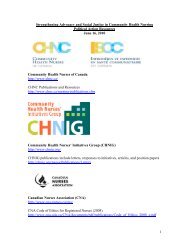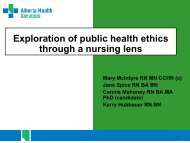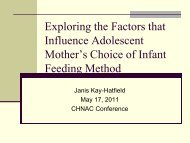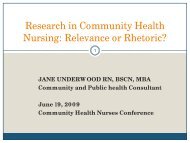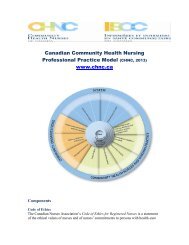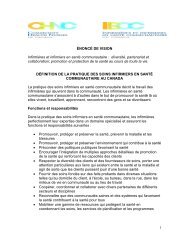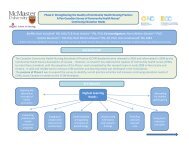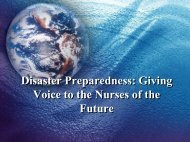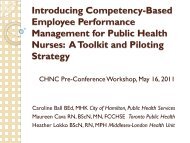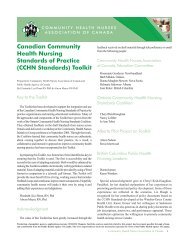Competencies for Home Health Nursing: A Literature Review
Competencies for Home Health Nursing: A Literature Review
Competencies for Home Health Nursing: A Literature Review
You also want an ePaper? Increase the reach of your titles
YUMPU automatically turns print PDFs into web optimized ePapers that Google loves.
their decision-making included seeking knowledge about services available to thepatient, collecting additional in<strong>for</strong>mation, adjusting the care plan and consulting withpeers during team meetings. Kihlgren, Fagerberg, Skovdahl and Kihlgren (2003)identified the need <strong>for</strong> community nurses to have expert knowledge and decisionmakingwhen considering whether or not to send elderly patients to the emergencyroom. ANA (2008), Gorski (2008) and O’Neill (1996) also discussed or identified therequirement <strong>for</strong> competence in clinical decision-making.CommunicationCommunication was acknowledged as a competency <strong>for</strong> home health nursing byseveral authors (ANA, 2008; Benefield, 1996; CHNC, 2008; Humphrey, 2002). Barnett(2006) called <strong>for</strong> HHNs to have “effective listening and non-verbal communication skills(p. 2 of 8). Wessel and Rutledge (2005) asserted that “Effective communication withpatients and families on end-of-life issues is a primary competency <strong>for</strong> clinicians” (p.213). Guthaus and White (2002) noted that “communication skills must reflect the abilityof the nurse to relate effectively to diverse patient populations and all levels of careproviders and their gatekeepers across the continuum” (p. 257). They further added thatin contrast to the acute care nurse, who often has direct access to the physician, thehome care nurse must often communicate through a third party, thus adding complexityto the communication process. Finally, Guthaus and White specified that “to avoidinappropriate interventions or changes in treatment plan, communication must bearticulate and present a complete and accurate picture that is delivered with theappropriate sense of urgency” (p. 257).The need to meet documentation requirements of funders and employers wasemphasized by Ellenbecker and Warren (1998) and identified as a complex (Herb,2003) or highly demanding component of home health nursing work (Ellenbecker,Boylan and Samia, 2006). The work of other authors pointed to documentation skills asa sub-set of communication and an important competency <strong>for</strong> HHNs (Benefield, 1996;<strong>Health</strong> Canada, 1996; Herb, 2003; Humphrey, 2002).Establishing and Maintaining the Nurse-Patient RelationshipEstablishing a therapeutic relationship with the patient, including respecting the family’sprivacy and gaining an understanding of client/family expectations, is foundational tohome health nursing (Higuchi, Christensen and Terpstra, 2002; Peter, 2002). Zurmehly(2007) described the nature of the nurse-patient relationship as a “blending ofboundaries between the family and nurse and client” (p. 166). During interviews <strong>for</strong>Zurmehly’s study, nurses “discussed the long-term relationships they developed withtheir home health clients as opposed to the relationships they have with patients whohave short stays in the acute care setting. Many shared how their relationship created aspecial bond and the nurse became an extension of the family” (Zurmehly, 2007, p.166). In palliative care, the nurse-patient relationship was depicted as “central to therole of the nurse and the <strong>for</strong>ming [of] an effective partnership” (Barnett, 2006, p. 2 of 8).Inherent in the nurse-patient relationship is the nurse’s care to maintain confidentiality,safety, security, dignity and respect <strong>for</strong> both patient and family (ANA, 2008, p. 18). This<strong>Competencies</strong> <strong>for</strong> <strong>Home</strong> <strong>Health</strong> <strong>Nursing</strong>: <strong>Literature</strong> <strong>Review</strong> 8




